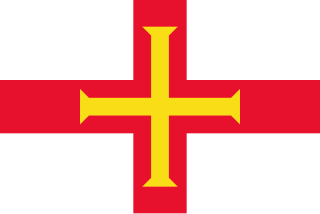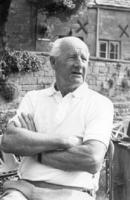
Guernsey is the second-largest island in the Channel Islands, located 27 miles (43 km) west of the Cotentin Peninsula, Normandy. It is the largest island in the Bailiwick of Guernsey, which includes five other inhabited islands and many small islets and rocks. The Bailiwick has a population of 63,950, the vast majority of whom live on Guernsey, and the island has a land area of 24 square miles (62 km2).

John Robert Fowles was an English novelist, critically positioned between modernism and postmodernism. His work was influenced by Jean-Paul Sartre and Albert Camus, among others.

"Sarnia Cherie" is used as the unofficial anthem of Guernsey, one of the Channel Islands. Sarnia is a traditional Latin name for the island. George Deighton wrote "Sarnia Cherie" in 1911, with Domenico Santangelo composing the tune later the same year.

Life of Pi is a Canadian philosophical novel by Yann Martel published in 2001. The protagonist is Piscine Molitor "Pi" Patel, an Indian boy from Pondicherry, India, who explores issues of spirituality and metaphysics from an early age. After a shipwreck, he survives 227 days while stranded on a lifeboat in the Pacific Ocean with a Bengal tiger, raising questions about the nature of reality and how it is perceived and told.

Stephen Meredith Potter was a British writer best known for his parodies of self-help books, and their film and television derivatives.

The Magus (1965) is a postmodern novel by British author John Fowles, telling the story of Nicholas Urfe, a young British graduate who is teaching English on a small Greek island. Urfe becomes embroiled in the psychological illusions of a master trickster, which become increasingly dark and serious. Considered an example of metafiction, it was the first novel written by Fowles but his second novel to be published. A revised edition was published in 1977.

Roy Dotrice was a British stage and screen actor. He played the antiquarian John Aubrey in the solo play Brief Lives. He won a Tony Award for his performance in the 2000 Broadway revival of A Moon for the Misbegotten, also appearing as Leopold Mozart in the film version of Amadeus (1984), Charles Dickens in Dickens of London (1976), and Jacob Wells/Father in Beauty and the Beast.

The culture of Guernsey in the Bailiwick of Guernsey is a culture which has been shaped by its indigenous Norman language and traditions as well as French and British cultural influences. Cultural trends from immigrant communities such as the Portuguese have also been added.

Upwey is a suburb of Weymouth in south Dorset, England. The suburb is situated on the B3159 road in the Wey valley. The area was formerly a village until it was absorbed into the Weymouth built-up area. It is located four miles north of the town centre in the outer suburbs. In the Census 2001 the combined population of Upwey and neighbouring Broadwey was 4,349.
Ebenezer Le Page is the lead character in the novel The Book of Ebenezer Le Page by G. B. Edwards. The book takes the form of an autobiography of an archetypal Guernseyman who lives through the dramatic changes in the island of Guernsey, Channel Islands from the late 19th century, through to the 1960s. The book is written in Guernsey English
Gerald Basil Edwards was an author from Guernsey.
Maurice Nadeau was a French teacher, writer, literary critic, and editor. He was born in Paris.

John Stewart Collis was an Irish biographer, rural author, and pioneer of the ecology movement. He is known for his book The Worm Forgives the Plough based on his wartime experience working in the Land Army in the Second World War.
The Adelphi or New Adelphi was an English literary journal founded by John Middleton Murry and published between 1923 and 1955. The first issue appeared in June 1923, with issues published monthly thereafter. Between August 1927 and September 1930 it was renamed the New Adelphi and issued quarterly. Murry was editor until 1930, when he handed over to Sir Richard Rees and the monthly issues resumed. Rees was succeeded by Max Plowman in 1938. The magazine included one or two stories per issue with contributions by Katherine Mansfield, A.A. Milne, D. H. Lawrence, H. E. Bates, Rhys Davies, G.B. Edwards and Dylan Thomas. The Adelphi published George Orwell's "The Spike" in 1931 and Orwell contributed regularly thereafter, particularly as a reviewer; in the late 1930s/early 1940s, working class writers Jack Common and Jack Hilton also contributed.

Yann Martel, is a Canadian author who wrote the Man Booker Prize–winning novel Life of Pi, an international bestseller published in more than 50 territories. It has sold more than 12 million copies worldwide and spent more than a year on the bestseller lists of the New York Times and The Globe and Mail, among many other best-selling lists. Life of Pi was adapted for a movie directed by Ang Lee, garnering four Oscars including Best Director and winning the Golden Globe Award for Best Original Score.
The Reverend Sir John Leale was a Guernsey Jurat and Methodist minister, who assumed the role as President of the States of Guernsey Controlling Committee during the occupation of the Guernsey by Nazi Germany (1940–1945).
The Guernsey Society is an organisation for people with an interest in the Bailiwick of Guernsey.
Edward Chaney is a British cultural historian. He is Professor Emeritus at Solent University and Honorary Professor at University College London . He is an authority on the evolution of the Grand Tour, Anglo-Italian cultural relations, the history of collecting, Inigo Jones and the legacy of ancient Egypt. He also publishes on aspects of 20th-century British art. In 2003, he was made a Commendatore of the Italian Republic. He is the biographer of Gerald Basil Edwards, author of The Book of Ebenezer Le Page which he succeeded in publishing following the author's death in 1976. This has since been recognised as a twentieth-century classic.











